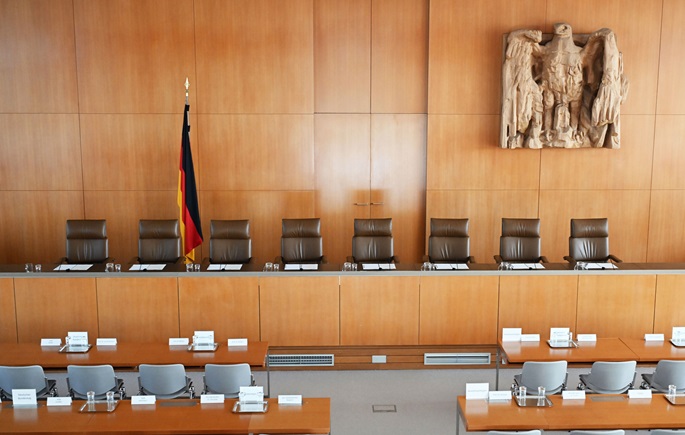German electoral reform partly unconstitutional: top court
Published : 31 Jul 2024, 00:43
German electoral reforms aimed at limiting the size of parliament are in parts unconstitutional, the Federal Constitutional Court ruled on Tuesday.
The reform, initiated by Chancellor Olaf Scholz's centre-left coalition, aims to limit the size of the Bundestag to a maximum of 630 seats. Germany's lower house of parliament is considered the world's largest freely elected legislature.
The current number of lawmakers in the Bundestag is 733, due to a complex voting system which allows for the number of lawmakers to grow depending on the election outcome.
Germany's population is nearly 84 million. By contrast the United States, with 333 million people, has 535 lawmakers in Congress.
German citizens cast two votes in national parliamentary elections: one directly for a regional candidate and a second for a party list, which determines the relative strength of the party in parliament.
But in order for parties to enter the Bundestag, they must receive at least 5% of the nationwide vote. The system that the reforms were designed to change had allowed smaller parties that did not achieve that 5% minimum to enter parliament via a direct vote for a regional candidate.
This aspect of reform - which was introduced in June 2023 and would have first taken effect in next year's parliamentary elections - is unconstitutional, the Karlsruhe-based court found.
No more overhang and equalizing seats
In order to reduce the size of the parliament, the reform no longer provides for so-called overhang and equalizing mandates, which the court considered constitutional in its decision.
Until now, overhang mandates occurred when a party won more direct seats via the first votes than it was entitled to according to the second party vote result. Equalizing seats were then added to restore the overall vote distribution.
Smaller parties push back
The hard-left Die Linke (The Left) party and the Bavarian conservatives, who normally do not agree politically on much, both took action against the law because as smaller or more regional parties they'd most be affected by the changes.
In addition, more than 4,000 individuals had filed a constitutional complaint. Their objections were based on equal voting rights and the right to equal opportunities for political parties.
Bavaria's Christian Social Union (CSU) and Die Linke had a lot at stake, as the direct candidate system is their most reliable way of entering the Bundestag.
In the 2021 federal election, the CSU, which is only present in Bavaria, received 5.2% of the party-wide votes nationwide. If it were to fall below the 5% mark nationwide at the next election, it would be thrown out of the Bundestag under the new electoral law - even if it were to directly win the vast majority of constituencies in Bavaria again.
Bavarian Premier Markus Söder, who is CSU party leader, was happy about the decision.
"This is a clear success for the CSU and Bavaria - and a slap in the face" for the ruling coalition government, he told dpa in Munich.
He said the government's "election manipulation ... has been exposed and rejected by the court," adding that the court agreed with the CSU's "core concern."
"As far as humanly possible, this ensures that the CSU will be represented in the next Bundestag," said Söder, adding: "The Federal Constitutional Court recognizes the strength and importance of Bavaria and the CSU."
But Scholz's Social Democratic Party (SPD) also claimed victory.
"The most important thing is clear after this judgement: The reduction in the size of the German Bundestag is complete and constitutional," said the deputy leader of the SPD parliamentary group, Dirk Wiese.
This now put an end to "overhang and equalization mandates, which have continually increased the size of the Bundestag and thus endangered its ability to function," he added.
As for Die Linke, in the last federal election it only entered the Bundestag as a parliamentary group via the direct mandate clause, as the party failed to gain 5% support nationwide. It did win three so-called direct mandates.
But since then, Die Linke has split, as long-time party member Sahra Wagenknecht has formed her own party, the Sahra Wagenknecht Alliance (BSW), leaving her former party in a deep crisis. In last month's European Parliament elections it only achieved 2.7% of the nationwide vote.
Wagenknecht agreed with conservative Söder that the court's decision was a slap in the face for the ruling coalition.
"Preventing another XXL Bundestag that devours more and more taxpayers’ money was the right thing to do," she said but added that the electoral reform, like other ideas from the current government, had been "ill-conceived and constitutionally questionable."


